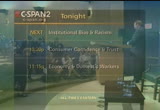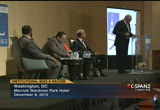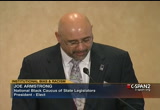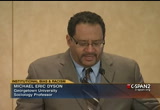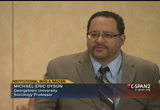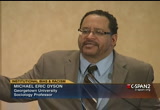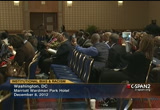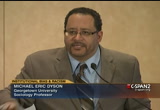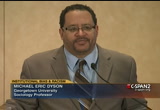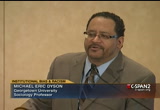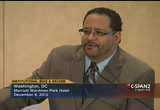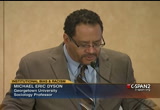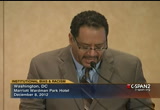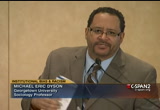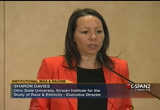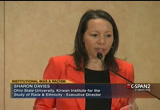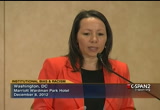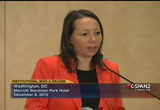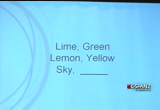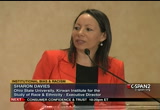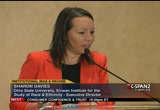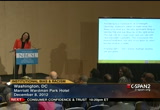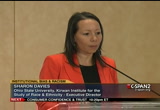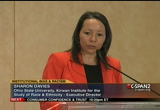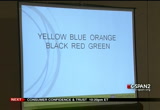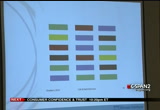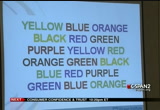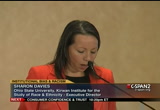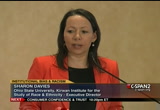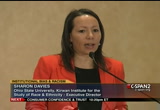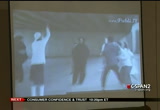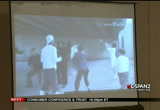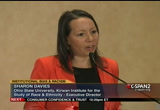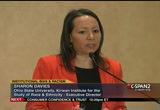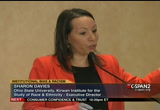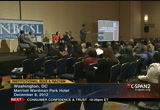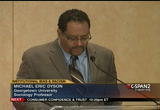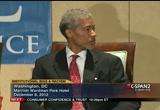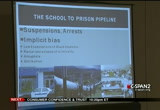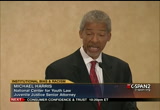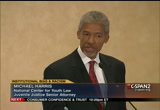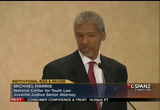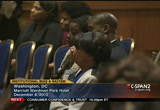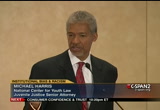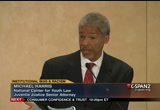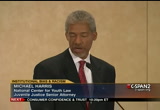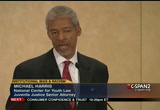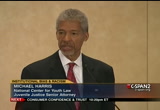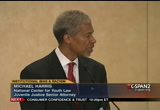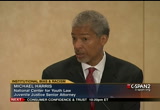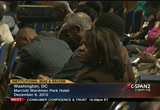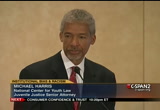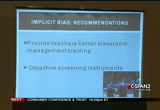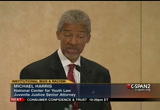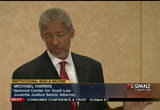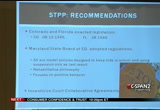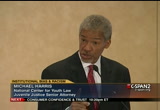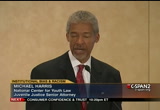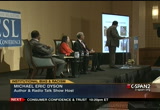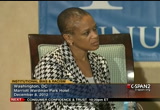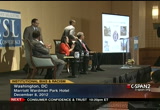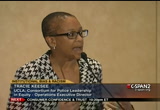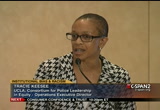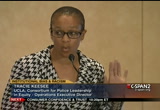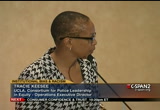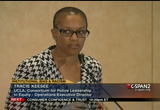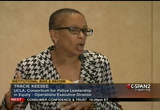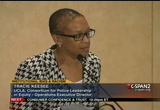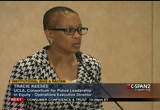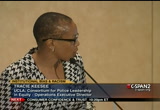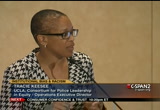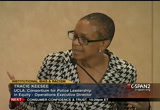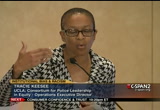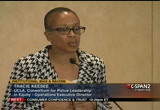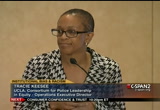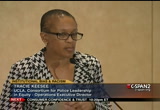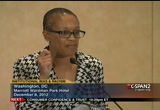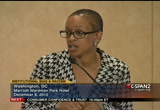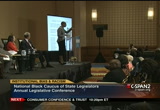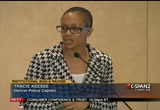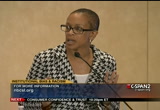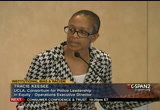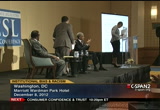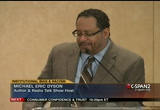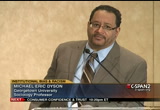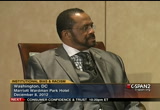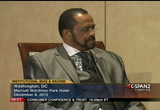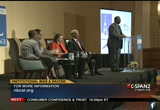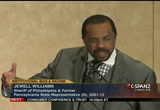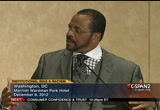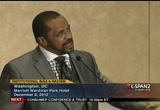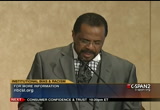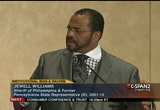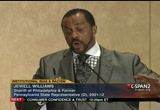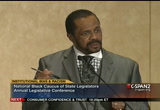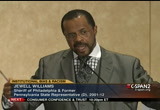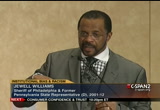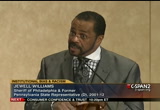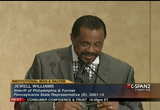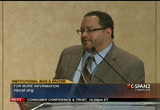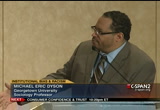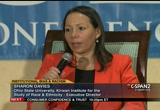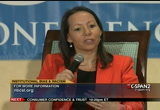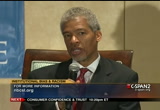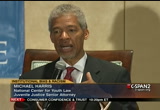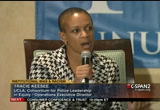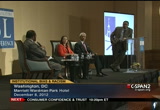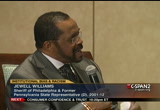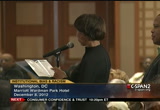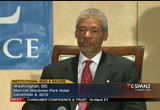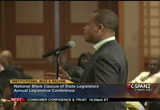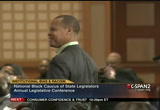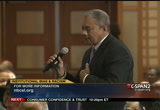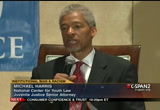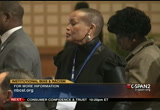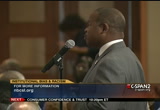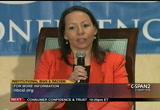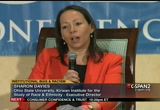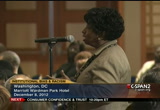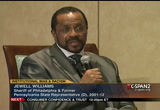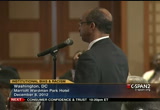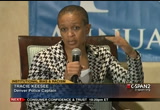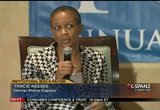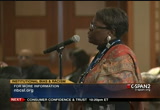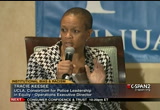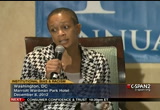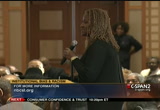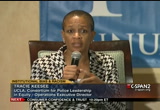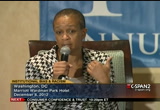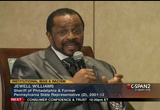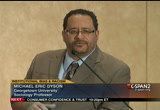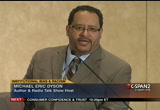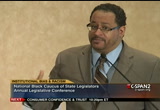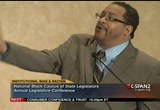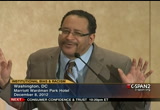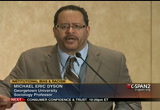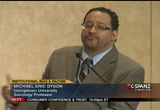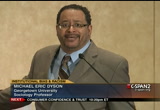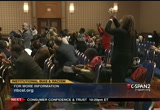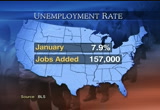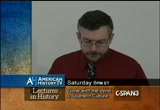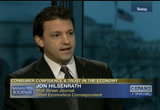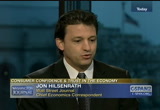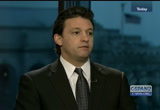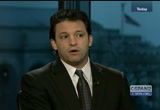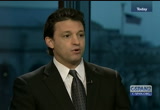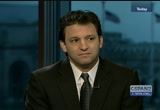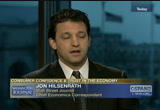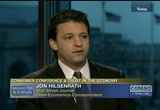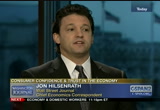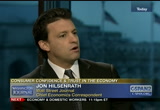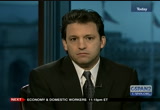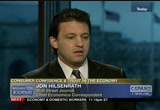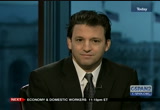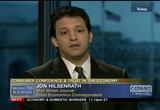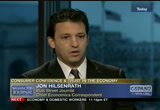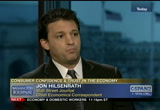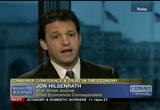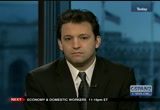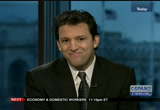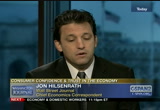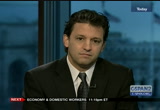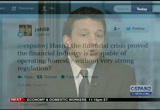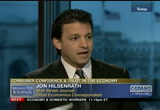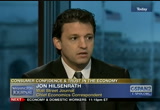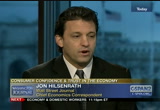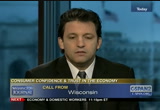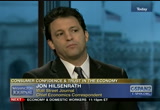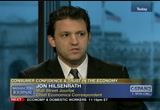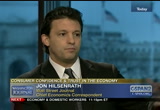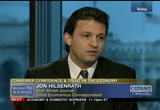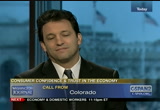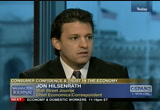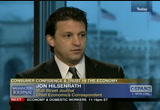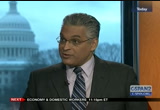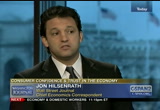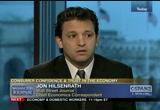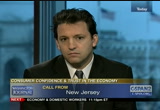tv Tonight From Washington CSPAN February 1, 2013 8:00pm-11:00pm EST
8:01 pm
8:02 pm
the naacp image award for outstanding literary work twice. dr. michael eric dyson is a genius who can write about any subject for the late civil rights of and martin luther king would reflections on hip-hop dinham race, the hurricane katrina catastrophe. if you turn your tv on, you can often find him on every major media outlet including the the today show, nightline, the o'reilly factor, the report. he is a contributing editor to "time" magazine and has an hourlong news program on npr
8:03 pm
called the the michael eric dyson show. nbc and join me in welcoming our commentator dr. michael eric dyson. [applause] thank you, president-elect armstrong for that very gracious introduction. it's an honor to be here today to talk about this very serious matter and how we can dismantle the institutional racism in the 21st century. we have an extraordinary lineup of panelists who will address that issue, so i'm not going to engage in any extended
8:04 pm
introduction accept to say obviously when we are talking about a society as a first and as multifaceted as ours there is undeniable evidence of the space institutions, the energy visions and populations in this particular country. so the undeniable progress that we have made, the ethnic diversity that we have observed, and the profound expansion of democracy that we have helped facilitate must be juxtaposed however to the persistence of malignant and often unconscious forces of bye yes that continue to undermine the best potential that we have as american citizens. it gives them the way and we don't know it. you can be a young boy walking down the street with some skills in your hand and saw ice-t and
8:05 pm
at the phantom and visible by s becomes concrete and definable. the anatomy takes shape in the repulsion of and repugnance to words black or latino or asian or other bodies. just as figments of imagination projected onto the screen of history and what goes on unconsciously what is a stereotype that becomes lethal and deadly when one person seeing another person acts on those stereotypes, that in plus at racism, that ethnic repulsion and all of a sudden this theoretical stuff becomes concrete. stuff that you talk about in classrooms skills over in a bloody fashion on to the street. so it's important talk about
8:06 pm
that, people say that to sit around constructing the body is and talking about implicit racism and talking about institutionalized forces of oppression, that this stuff that you would find in the textbook. you all know that although it becomes more difficult to legislate in the face of the shift from the very concrete expressions of racism to the implicit bias and unconscious racism and yet the institutional matrices that tells the body is have to be talked about coming and we have to talk about mechanisms of distribution and the ways in which the stuff is distributed in agriculture of consciously and unconsciously and how to manifest itself, as we have these folks here to break it down. i am just above director. they are going to break it all the way down but that stuff makes a difference, playing your music too loud, get shot. in america, right?
8:07 pm
i mean, what is going on in the unconscious of people's minds, their psyche that they feel obligated to be given a certain fashion to exercise lethal consequences on the bodies of our vulnerable young people in our populations. and then of course, to talk about in a more specific sense how even before them when we speak of school discipline and the ways in which our younger children are treated, young people are treated, you know amnesty international did a report 15, 20 years ago that suggested the same problems that sally and johnny in terms of mean street white america are hit on the back of their hands for don't do that again, young black and brown people and increasingly asians are redirected towards a criminal justice system, towards detention. then you get marked and you get
8:08 pm
stigmatized and when you get marked and stigmatized then you become eligible and vulnerable for institutional if you will criminal behavior. institutionalized criminal activities. institutionalized criminal realities. you put in detention that is a warehouse where schools become warehouses and pipelines for detention in jail and prison. how do we stop kicking kids out of school? zero tolerance policy isn't no such thing as a zero tolerance always going to be an exception when you run into things. always going to be an exception. any holder is an exception. even jesus got mercy and grace. you haven't heard a sermon i'm
8:09 pm
trying to preach. i ain't preaching tomorrow so i might take it out on you all right here today. [laughter] but we have these brilliant people to talk about implicit unconscious racism, the function and the role of those realities in our lives when young people and getting stigmatized, put aside a contract in different ways and then they become, you know, victims of a vicious process and an institutional expression that is not often talked about and when we do we get blamed for being racist. folks who point this out and the the ligaments of a racial animus get accused of being the very perpetrators and the perpetrator of the legacy of white supremacy and social injustice and racial inequality. we just have to keep fighting past that. we are in the age of obama.
8:10 pm
but one great black man living in public housing with his family cannot turn its all right. he is a great man and a brother is going to be in public housing let it be 1600 pennsylvania ave. no doubt about that. [applause] i just want to see him come out one side with a housecoat on. with his cap, wassup! [laughter] but that's my fantasy. that's just my fantasy. wonderful, beautiful, brilliant people. the first lady, the president and their two wonderful children, but we want all families that are black and latino and asian and other indigenous people to be treated with equal respect and dignity. and we want all of our kids like
8:11 pm
sahsa and malia to be treated with recognition that is due to them sweet talk about these issues because they are extremely important. so i am going to introduce our speakers and the order in which they will appear first of all professor sharon davies is a very gifted scholar. she was the editor of the columbia law review while in her law school at columbia. you know about that and when barack obama became the first black editor at the harvard law review people made a lot about that because they understood the academy broke into the larger world so you understand what pedigree she represents. with the young people would say. after graduation she worked as an associate in johnson and d.c. and a new york city she served for five years as assistant united states attorney in the criminal division of the united states attorney's office in the
8:12 pm
southern district of new york which is why they are considered to be the u.s. attorney's office in the country if others are here from other u.s. attorneys offices, we apologize for her superiority. [laughter] , down. i am a leader sam sali get that all the time. she joins the faculty at ohio state university in 1995 and was awarded tenure in 1999 and promoted to full professor in 2002. her primary search focuses on the area of the criminal law procedure and she is published widely in overall ayittey of journalists and places where her ideas about critical, legal and
8:13 pm
social matters have certainly been expressed. so i'm going to have the professor davies come to the podium and share with us for about 12 or so minutes about her ideas about our topic today. she will lay the groundwork on the bias and the implicit racism so that legislators and the rest of us can better understand how it manifests itself in the racism and the systemic discrimination that we've been talking about already and help people can act against their conscience principles and values. you think you are doing one thing clean and clear and the individual attribution of good things to a person consciously a lot of stuff would be going down. she will address these disparities and provide description for how the legislators can address the
8:14 pm
barriers you can break that down in the book but she is going to break it down in 12 minutes. [applause] thank you very much. it is a pleasure to be here. and i only have 12 minutes, so i am going to jump right into this introduction. the emerging body of learning that is around implicit or unconscious by is and the way that i decided to structure my remarks today is to have you all participate in yourselves in a few slides that are intended to enable us to see how it is that our brands actually operate and ways in which we are not aware oftentimes and so the body of the emerging -- the body of learning about the unconscious biases about the idea that we
8:15 pm
have a seat have thoughts that have been automatically very, very quickly coming and oftentimes without realizing that those associations that are firing off in our mind and that can be a serious matter and even a lethal matter depending on what it is those associations are. so let me start this by talking about a book that explores it is just a terrific book who is a nobel prize winner for his revolutionary work in helping us understand that we do not make judgments and decisions as rationally as we tend to believe that we do. and so this book was called thinking fast and slow because it makes accessible some of the cutting edge of learning about
8:16 pm
the implicit bias and in this book for persons like me he learned away the brain works in two ways, system one and system to. constructed the interpretation of all of the data that bring the processing in every given moment and operates without conscious effort and it operates without voluntary control. the core quality of the system fast thinking is something called a sensitive memory and what that means is house we grow and mature our thinking is honed and we begin to think about the world is as yet fully and not
8:17 pm
realize that we are even giving it. it's another very different way in which our brains work. this is a slow, this is the leverage of, this is orderly. this is effort. this is the systematic scheme of thinking that we bring to our most arduous task. most of us in this room think of ourselves as a very rational, a collaborative thinkers and with associate with the systems to thinking but what to daniel and his colleagues have shown us is that very often have a brain is utilizing systems thinking far more often than we realize. the scientists estimate of the human brain takes 11 million pieces of data in a second.
8:18 pm
11 million we are consciously aware of only maybe 40 pieces of data and second in so that means our brain is doing a lot of work for us that we are not consciously aware of including making associations between things. so if you look at the screen, this will become apparent to you. we think very quickly and as a seat things with each other like rum and yellow, sky blue said this is the associated processing and for those of you that you knew the answer was blue, you knew that without any effort at all and just appeared in your brain as soon as you saw the word sky that is an example of how we assess the eight words with one another.
8:19 pm
we also associate categories. let's try another slide such as mine today. black and white, young and old. not one of you said something the was different from the crowd, and none of that took any kind of real hard effort for work on your part and that is in the example of how we sort of things categorically and associated them with each other. and also in our systems we want to think of rearranging realizing we are doing it and we do it automatically so that these associated thinking as meaning making thinking. i'm just going to move on.
8:20 pm
see if you can make sense of what you see. read it out loud. more of you joined senator cook and i was expecting. but you can see for those of you that did read it out loud it didn't seem to take you any work at all. think about that for a second because any word on the screen accept for ra and was was misspelled so how was it possible that the brain is still able to read that so easily? maybe it is senator cook and the others of your that actually read it out loud just particularly right so let's
8:21 pm
8:22 pm
in a particular way but actually we recognize them associated. once we become adult readers we are not linear. we are quick thinkers in the that is great but it actually can be a problematic thing as i will explore in a minute but first let's think about the contract and systems and maybe this would be a good example of the systems thinking and operations. for this example this is something we use both system one and a system to to consider systems one as we recognize it is an object. this is a problem that can be solved often for some of us with pen and paper some of us are
8:23 pm
able to be a problem like that in our head. for those of you that are attempting to do that problem in your head there is something you may not realize, and that is you are now relying on the systems to analytical the leverett of thinking to do it it's slower than system one and you may think that it's only a matter of your mind being involved in it when in fact your whole body. your blood pressure went up a little bit. your heart rate increase and your pupils dilated as you were trying to solve this problem and they would only go back to the normal side.
8:24 pm
they would focus on a mechanism which is quite intense and very, very helpful some of you saw this problem in your head -- >> [inaudible] [laughter] now they are all back to normal. something we do very quickly and other things we do less quickly with systems one and systems to. if you have any problem reading those words out on the screen very quickly thank you.
8:25 pm
yellow blue orange black and red and green very fast. no problem at all. and we would be able collectively to also call out colors. senator can i ask you again to call out the colors that you see i don't mean to get fashionable and the descriptions. i'm going to go left to right, greenup read purple jello green purple brown red purple greenup brownlow read yellow greenup, green and purple brown, purple green green. okay. fast but maybe not as fast. a genetically had to put more effort into calling out those colors so that tells us that the associated connection is not as
8:26 pm
strong as when we see a written word but what happens if what we are trying to do is run counter to the powerful associate of mechanisms. when going to do is i'm going to ask you all to ignore the words and just pay attention to the colors and call out the colors as senator cook did in this particular screen. so again, ignore the words, just call out an order the color of the words that you see displayed green, red, purple, yellow, brown, red, purple, green, brown, red, you've read, green,
8:27 pm
purple, brown, purple, red, green. it now that was hard, wasn't it? you could feel your brain almost at war with itself. it identifies with words so quickly trying to end tension with the task at hand. you will be prone to error. that is something that we need to focus on. it means that the system's automatic mechanism is an important thing houses the system to thinking, but we need to be careful about our prone error when we rely on it without
8:28 pm
thinking. now system one also has a possible problem for us and that is that we intensely focused with systems, too as we are utilizing that intense focus mechanism. but when we do that we can also make mistakes and we can fail to see things that were so concerned with the task at hand. we know that driving becomes habitual almost after a certain amount of experience. they rely on assistance to focus and navigate that safely and. if we are driving a youngster as
8:29 pm
social beings we will instinctively quiet down and distract the individuals intense focus mechanisms for getting past that. this is an example of how we focus on something that we take our eyes off of other things. now i want to show you a video clip that demonstrates this. some of you may have seen this and if you have, don't move it for the rest of you because i'm going to ask those of you that haven't seen this to count the passes but the team dressed in white that you will see on the video clip and i'm going to get out my powerpoint presentation to go to access it here is what i really want you to do. i really want you to see that
8:30 pm
there are two basketball teams on this court. i want you to only focus on the team dressed in white and count the passes, the number of passes a team dressed in hart makes to each other. count the number of passes and after to see how everybody did okay, here we go count the number of passes the white team makes.
8:31 pm
8:32 pm
the bear i will tell you i've shown this video clip to a lot of audiences who don't see the moonwalking bear when they are counting the passes. how can we miss something as obvious as that moonwalking their? this tells you something about the intense focus mechanism of the system on thinking that we can be so focused on one thing and also thinking ssa to flee that we are blind to other things that are obvious as a moonwalking. that tells us about our brains and how we have to be very careful about how we are thinking things through and whether or not even as we focus on the things we may take our eye is off of the ball. i think i'm going to have to
8:33 pm
finish up pretty quickly but the other folks on the panel will be able to tie all of this learning about the brain to the concrete situations like how it might be that police officers see something that's not their, or george zimmerman might see danger when there was no danger in the body of 17-year-old boy or help teachers may perceive danger in school discipline scenarios that actually is something different than what they believe that is enormously powerful meaning for people. some of the best evidence on this is the implicit association test that was devised by scholars at harvard university. and this shows us that
8:34 pm
americans, even americans with the most sincere and strongly held principles will sometimes think or often think associated flee when they're thinking about race. this is an example of a slide that you can find on the internet, one that you plug in an associate association test was designed to look at response times. how quickly did the papers of this test is the seat for an example faces that have features with words as opposed to bad words and how quickly can we associate white or caucasian states has opposed to birds come and now hundreds of thousands of people have taken the implicit association test not just
8:35 pm
studying racial associations but also gender associations come age associations, a great number of associate of thinking so that have been tested here. but the results are stunning. they show that 75% of white americans have a robust association of white with a good and black with bad and very disturbing way that even black americans will have many of those internalized against the group's so i think i'm going to stop their with my fellow panelists to connect the dots. thank you. [applause] >> watch out for the dancing moonwalking their. that will preach a sermon as
8:36 pm
well. i live up to that stereotype for sure. the presentation will be able to dig into that and talk about that tremendous discussion of the system's one and systems to a and the analytical way of thought and what that actually leads to. some of our other panelists as she has indicated will help us understand this, for instance we are going to bring up now the senior attorney for the national center for the youth michael harris who will discuss how the by a cs played out in education particularly of the unconscious leads to discrimination and re of black and brown males concerning expulsions and the school to prison pipeline that i touched on briefly.
8:37 pm
before joining he served as the deputy director of the institute in san francisco working to reform the juvenile justice systems. he's worked in california and washington to reduce racial disparities in the juvenile justice system using a collaborative process to affect systemic reform. prior to his stint he was a staff attorney and assistant director of the lawyers committee for civil rights in san francisco and graduated in 83 from the hastings college of law and 1980 graduate of ucla a former fellow at the legal services of south-central tennessee so his extraordinary experience tied to his analysis of these matters is extremely
8:38 pm
important. let's welcome him to the podium now. [applause] i am just going to pick up where share and left off. i'm going to try to take and apply that so of course you know basically what we are talking about when we say that is what started off as a snowball has grown into debt avalanche policy that has pushed out the use of color of the school and that this is something that started as a philosophical change as the school level. before when i was in school many of you when kids got into a fight, when we yelled at each other into custody to other or we were just unruly in the classroom, that was handled at
8:39 pm
the school. we stayed after school. we ran some laps or did something that somebody on the staff took care of that. now, in many school districts across the country for that very same behavior people are arrested or expelled were suspended from and this is what we are referring to when we talk about the pipeline, that transition, the philosophical tradition of excluding kids for - behavior is as opposed to responding to them on the school campus. now, what is important to understand about the school to present a plan is dr. dyson touched on this already in effect several students more than others and the students it affects most black students but also has an impact on black and asian students and so there are racial disparities and who is arrested on school campuses whose expelled and expanded. we know from the research and
8:40 pm
there was a great city that was released in the ucla recently suspended at two to three times the rate of white students. so we know the disparities are enormous and those are to be doubled to a number of policies that set out the school to prison pipeline and is also attributable to what was just described and what we will talk about before as implicit bias because it comes into place whenever there is discretion and decision making. and so, every point along the way when you talk about suspension, the expulsion and of arrests some question these cases whether or not they are going to go forward with of that discipline. and when that discretion is used the implicit bias comes into place. so you have a very excellent one on one on how our brains work.
8:41 pm
analytical and assess the test. and so we know some things about the implicit bias already. since we have that course i'm just going to touch on here. first of all, we know that most teachers have lower expectations for black students and students of color in general. so what that means is they expect them not to study at all, the expect them not to do well and expect them not to trial and so as a result they will not put an effort into the students when they struggle. we also know that there is an association. stay with me. association meaning there's an implicit association without there being consciously aware there's an implicit association between black students and criminology. so just like she was singing on the implicit association test, there's an association between black and white, bad and good and criminology. so all they did before campus on the very first day you have
8:42 pm
these headwinds pushing against of you are a student of color. so, we also already know that the brain -- this is called brain science research it can look at your brain and do studies and show you pictures that we know that when people are shown pictures of black people it requires the brain to get activated while the oxygen goes. that part of the brain is called the and it's part of the brain that response when you see a tarantula spiders are big gigantic snake. in contrast when people in the studies are shown people pictures the part of the brain that gets activated is the part of the brain that deals with empathy. so therefore you would think about what the implication of that would be. so if you have somebody a teacher, principal that is dealing with the situation of discipline. when you deal with black
8:43 pm
students it is a part of the brain that deals with your. that can lead to different results that causes the disparities that we see. there's also a police officer and probation officers we're talking abut siskel dippers and pipeline. -- the effect law enforcement at the stations at schools and the effect the other professionals in the juvenile justice system and the law enforcement and probation officers and they were given the fact scenario the student is white and the other the student is blacks we split up the groups in half and ask what would cause the bad
8:44 pm
behavior that they are describing in this scenario. so what they suggest is the cause of the bad behavior have of the guerrillas told the behavior was -- to resolve these were internal things. he had a bad character. he was a bad kid. the fact pater monday were told it was a white person, it was external factors. so the attributed to the bad here group being associated with that group or coming from a broken home. so, the implication is that both hour exterior things that can be addressed and dealt with and so therefore, it is much more likely that particular person could be helped and changed. behavior could be changed as if someone who was that there is nothing that you can do to him. so these are the ways in which the implicit bias affects the decision making in the school to prison pipeline. so, i want to touch on the four
8:45 pm
things that structurally are policies that lead to the school to prison pipeline. there are other factors that these are the major ones in my estimation. first and foremost yuval for about a zero tolerance. i don't need to say much about what that is. but just understand the zero tolerance came about early on and it was brought about a basically in new york city the mayor started with a broken when those. basically that theory was that you have to stop the moral and significant role in picking lawbreaking is because if you don't it will escalate and become much worse so that was the general philosophy behind it subzero tolerance came about in that context and then in the 90's the federal government passed a law called the gun-free schools act and that law said that if you want federal money for your school if you received this federal money must adopt a
8:46 pm
zero tolerance policy. but it was only required that you adopt a zero tolerance policy because of these people have the notion of broken windows. the expanded it out and it wasn't just a zero tolerance for the weapon. the expanded and made it zero tolerance for drugs, zero tolerance for alcohol, zero tolerance for tobacco, zero tolerance so as a result, zero tolerance that basically means you have punishment, no ability to deviate from the subset punishment so anybody that can it's that punishment commits the offense and so you have this draconian response in this peter said you heard stories about how the zero tolerance plays out ridiculously to have a temper
8:47 pm
tantrum at school and as a result of that temper tantrum the police were called, she was handcuffed and taken in a squad car down to the police station because she had a temper tantrum in school so this is house your tolerance plays out and it isn't going through that generally it is the black kids that this happens to. they said it would make things fair because the response is the same for everybody. it's mandatory that you respond in a preset way that should take the discrimination out of its so what we saw instead was the mandatory extensions disparities got better. they stood in this punitive approach to dealing of this behavior the discretion that we saw in the increase in racial disparities and we saw the increase in the number.
8:48 pm
so zero tolerances' been a disaster and i sure the doctor is going to touch on this, but the scholars and the universities have shown your tolerance hasn't been shown to improve school safety and they haven't been shown to improve outcomes for the students that are excluded or the students that were left behind after. so the next policy, i know i have limited time, is acceptable policing and this goes hand in hand with a zero tolerance approach because the notion is you have to have this oppression if you are going to be punitive and punished and to have to have people in place to do that so what we have seen across the country is a huge increase in the number of police on campus of course the disparities.
8:49 pm
students of color are much more likely to be arrested. the other side effect on the causes of the pipeline is a reduction in the resources because to law enforcement officers from the campus have to be paid. that money comes out of the budget that otherwise would have gone to programs and activities, extracurricular events that dealt with of the type of achievements, marginal students that are on the borderline academically that may not necessarily be completely engaged, but if they had a chance to start in the school play or if they were really good in sports or if they were maybe in the choir and they could sing well and got recommended mission and acknowledgement for that, they would continue to go to school. but now that other things are done in many places it's now been cut down those lifelines
8:50 pm
are gone and students are leaving because of it. so that is a major contributing factor as well. and then this one is very important. high-stakes testing succumbing you all are familiar with how this plays out. in one way what we have in california the instituted a test that you have to pass in order to get a diploma when you graduate from high school and we start getting the test in the tenth grade. so the idea was this would force the schools to teach the students cannot so when they get to a little grated they are ready to graduate they will know what they need to go to either go to college or go to the workplace and be prepared. but instead what has happened is the students do so poorly when the first ticket because they start taking it intend great to get ready for it so they can progress and do better. they get discouraged and they
8:51 pm
think there is no way that i can make up all of the grout i need to make to be able to pass this test and so what is the point? why should i keep coming to school if i want to get to graduate? so it's had the opposite effect of what it was intended. secondly, and i assure you all heard about the scandals that have happened with teachers cheating and all that stuff, it's changed local culture and what they were trying to teach students and the best teaching them how to think critically and how to be aware of what is going on in the world, they are teaching so they pass the test. so it's been a devastating fema number of levels. high-stakes testing has also cash. the one piece that i want to say about that that is really significant is what we have seen in many school districts across the country students that are marginal and that will not do well on the standardized tests are pushed out in various ways so that the remaining students will score higher in what a
8:52 pm
further competitive pressures are either school versus school or compare the purposes or try to meet the tough targets for both child left behind. they are trying to get the scores up but instead of getting the students to perform better, they are getting the students out of the testing. so this is how the high-stakes testing is leading to the pipeline. okay. so, i've got the recommendations for you and i know that most of you all our legislators and i try to focus on what you can do when you go back and think about the new legislative session. what we know is in the schools where there are a majority of students of color particularly in this concentrated poverty the overwhelming majority of the teachers in those schools are inexperienced. and so, if you look at the juvenile justice statistics often it is the most common that leads to the detention is
8:53 pm
disrupting class, disorderly conduct, and in some places the call but basically fighting. have different names in different places but it's basically fighting. all these things that teachers and other schools could deal with if they have the skills and the viet experience or of the experience to handle that on the school side. but what we have seen is because law enforcement isn't it, it's taking those kids and funneling them into the juvenile justice system so if we have training and this is where you come in because most states teachers have to give license before they can teach. it is in the state matter. so in that should be training for classroom management so they learn how they are taught so that when that disruption
8:54 pm
happens they can manage it and keep teaching rather than call law enforcement and have that kid going through the school in the pipeline. in the second thing is in the juvenile justice peace objective screening. this is a way that we take some of the bayou sound of how the decisions are made in the juvenile justice system. in new mexico they passed a law that requires that for anybody that is brought to the detention by law enforcement when the decision is made where they will be locked up in the outcome of the case or whether they get to go back home in that process that is done by an object of screening the subjectivity is removed so the body as can be taken out. those are two things it's hard because it is so difficult to get. most people don't even understand their implicit bias is activated in making decisions so it's hard to understand that
8:55 pm
that is what is going on. so, i have two examples here from colorado and florida of legislation that has two different approaches but are doing the same thing which is overturning the fundamental philosophical approach to the zero tolerance approach and so in florida they call it zero tolerance but in essence they have turned on their head. with the set is the same thing they're doing in colorado days passed a law and they told other districts in the state's you have to change the way you do discipline. the state of maryland and many of you already know this, the state school board okay i see a recognition here to read the state school board did this and impose regulations in the state of maryland to do the same thing. so, what did they do? no more misdemeanors can be referred to the law enforcement. they have to be addressed at their school. changing the philosophy. we do not want to exclude students from the school environment. we want to keep them there.
8:56 pm
we understand the students are not perfect. we want to take you where you worked. that is a basic fundamental shift in the philosophy on how to deal with this behavior in schools and so these are perfect examples of what you can do in your own state if you want to take zepa. finally, i want to touch on -- some of you may have heard of the judge from clayton county georgia and he has developed this model of collaboration between the juvenile justice court for the police and the county social service agency and in essence what they've done is develop a protocol that requires all misdemeanors to be dealt with in school. no more referrals to the juvenile court on misdemeanors on the first occurrence and the second occurrence. the first occurrence is a warning. the second coming you are referred to a panel that has community service providers and
8:57 pm
the county social services and you are a reformer of your student and your families have connected with support to help to deal with the underlying problems that may be causing for disruptive behavior as opposed to just sending you to the present pipeline. they have got an incredible results. they reduce the referrals to the juvenile court by 67%. they reduce the racial disparity of those referrals to the juvenile court by 33%. and importantly, includes the graduation rate by 20 percent. so, that gives you the sense that the whole thing about zero tolerance ase al-awja eight. it's not making schools safer, it doesn't help students learn much. it's actually doing the opposite. and this is proof that if you go back to the rehabilitative model, we can actually do better for our students and have better outcomes, how your graduation rates, less sustention.
8:58 pm
-- sustention. thank you very much. [applause] >> for that stimulating conversation we certainly will pick back up on the many of the policy recommendations that flow from the implicit bias and then the attempt to consciously overturned the philosophical architecture and the logic of one of those public policies are in place. i want to now introduce dr. tracie. she will discuss the consortium for the police leadership in the equities research on racial profiling. excuse me to get and the use of deadly force along without the unconscious by yes leads to discrimination and incidents with respect to black and brown
8:59 pm
males. she will also discuss the ground-breaking research that has been done with police officers understanding how effective training can override prejudices' and that that can lead to fewer deadly force incidents that we have seen populate our culture far too often. dr. keesee is a native of colorado and with the denver police department. she is currently the deputy verdict of the colorado information analysis center and is the co-founder and executive director of operations for the consortium for the police leadership in equity. previously, she was the vision chief of technology patroled three districts, patrolled district three and five as a detective of crimes against persons so a lot of on the drug
9:00 pm
experience and the public information officer for the chief, the internal affairs bureau, the police training academy, the gang bureau into the commander of the information technology development unit. she holds a b.a. in political science from the metropolitan state college, and m a and criminal justice from the university of colorado-denver and a ph.d. from the university of denver and the intercultural communications. she is a graduate the class of the fbi national academy in the 1994 class of the african-american leadership institute. so we welcome her with her wealth of experience and insight to the podium. [applause] ..
9:01 pm
it worked. i can tell you that. i share with you i wear two hats. thank you are in introduction. i'm a twenty four member of the police department. i'm currently at the rank of captain. i'm at the co-founder for police equity along with ucla. and the work we've been talking about today is based on the work that and jennifer have been doing. so i've had the task and i would say the love of trying to reform my police family in this matter. it's a long road. it's a long haul. it's a lot of drama. and a lot of what you see up
9:02 pm
there missing. that's women. we talk about diversity and bring you something special. i'm not necessarily don't want to disparage away from my brothers. we bring something to policing. we're going talk about who are we? we have a group of researchers and police chiefs. and what we're talking about is accountability and transparent sei and policing. all of them lead to the legitimate sei and the fair practicing of policing. i think all of us in the room. i throw the question out. how many have been stopped by the police? [laughter] are you serious in the question? keep your hands up. there's some that who have not. okay. so it happens. keep your arms up. you had church this morning and now is your exercise. how many in your characteristics with the police it was okay.
9:03 pm
put your hand about it if you didn't feel bad about it. [laughter] exactly. so, yeah. it was okay. how many of you had a bad experience? a set of hands go back up and how many had multiple experiences? even more hands go up. okay. i'll keep in mind. so when we talk about how do we deal with that, individual officers who have contact with the community and leave an ever lasting impression on you, and with some of that could also take your life. how to you begin to unpack that and reput back together and bring in the best and brightest who understand how to talk and communicate and dot job we swore to do. i rose my hand and took an oath. what the cple we look at four areas which community members and police i say are the top
9:04 pm
four. there are many more. racial profiling and use of force. we keep them together. we look at them separately. when we dress them, we address them as one. immigration policy enforcement. over the last couple of years that's been a huge issue in wanting to make police officer immigration officers. a big problem with nap we've been dealing with that. organizational equity what i tell officers and if there's something wrong in the house there's -- it's going to show externally. that's a leadership issue as well. we talk about that. and of course we talk about juvenile justice and talk about in school, prison pipeline. when i was in school there was no police officer in school. whey feared was my mother and father walking through the door. so and i don't know when we got
9:05 pm
away from that. i was there when it started. so just a little brief. i want to get to some of the research we've done. so you a folder on your chair, if not. all of the research materials in there for you to take and kind refer to if you want to carry on the conversation when you get home. i want to make sure that you have that. so the participating agencies, if you don't see your state or your police department represented up here, please don't think something is wrong. these are the pioneers. these are the chiefs that stepped up and said we are willing to open up our organizations and let's begin the conversation about race. and in a police organization, that's a difficult thing to do. and those great chiefs have a tremendous amount of pushback in dining so. you know, i tell them, you know, you're brave but it takes bravery to kind of mark that path. and so these are the participating agencies on the left and including international and then our funding sources are on the right. the one thing about the cple we
9:06 pm
do not take money. we go the research for free to the organizations and to the police departments because of our funding sources. we are always very proud of that fact because, you know, when you buy a research, you make it and say whatever you want. we were adamant about not doing that. that worked out for us. and of course, the cple itself is housed at ucla in los angeles. so let's talk about implicit bias in research. that's one of the things that as a young grad student i was interested in. i've been on the street far long time and i worked in the street and gang units. whey thought was interesting to me is that my response was always different to what my counter part's response would have been. and counterpart did not look like me. typical in my large police organization typical all white male and typically the females are a small percentage or at all. typically there aren't any.
9:07 pm
my parents were not thrilled with my career choice. i told them that's what happened when i was in the corner reflected. i looked like i wantedded to a police officer. [laughter] we make these decisions we don't do them lightly. i can tell you the conversation i had with my parents and grandparents were those of their reflective memories of growing up in the south. they were not comfortable of me doing it. they were afraid for me. i couldn't make the connections of why. until i got out of the police academy. and so with those experiences, we began then to take a look how do we begin to change the culture and how do we begin to select officers to come in and do what all communities us do. that's to keep them safe not make you afraid of me but keep me safe. let talk about the first one. the second one was mentioned earlier by one of my fellow panelists. i want to talk about the first one. let's talk about discrimination and this particular research study we did for salt lake
9:08 pm
city. police chief chris burbank told us so bravely he had a bill in the house getting ready to be pass wanting to deputize the police officers immigration officers. you stop anybody and ask it them for the credential and say do you belong here? and most of us in law enforcement know we knew what that was going do. you already know trust is. let's throw one more layer on top of it and make it worst. he had grave concerns. what we did is one of the issues he had is a lot of lawmakers were saying hey, if you do this, you'll reduce crime. because the association of crime and people of color was that the only reason why they're over here is to take our jobs. you remember the arguments, two, they bring the criminality and bring the diseases with them. remember the conversations. reflect back and say that sounds familiar, doesn't it?
9:09 pm
insert here. it sounds very familiar. one of the things that we did is through cple went to the community and with officers and surveyed them. a lot of times you have to ask. ask and people will be honest with you. they will be honest with you. and so what we did is did a survey. we surveyed police officers and break down there as far as the methodology in the pact and did community members. and the key with the cple, you have to have a community voice. i can't just listen to what chiefs want and say this is kind of how we want to fashion our research. but what does the community want? we serve the community. so the commune city is very involved and what the expectations and outcomes and those questions those research questions would be. so in doing so, we went ahead and did our survey. one of the things i want to point out to you on there as well, not only did we do community members, we did undocumented community members. we had to have interpret at a at
9:10 pm
a folks sitting there. we paid people and give them, you know, vouchers for them. vouchers for i think some folks crowingers and safeway and food is important to anybody. we did that. and the results that we found with the data for the southbound 81 what we thought it would be. one, the officers didn't want to do it. they said we have enough problems as being seen as racist. we don't want to add to this. we adopt our jobs. secondly, we know, if we do something like this, the willingness to report crime is going to disappear. it's barely there as it is. but with the community specific community it's going to be gone. they will nautical the police if they think they're going to be deported. if you are a victim of domestic violence you are not going pick up the phone and call for help if you think, your children, and breadwinner will be deported. you won't do that.
9:11 pm
you'll they a constant state victimization. probably more importantly when we surveyed the citizens. the citizens said the reason they wouldn't call the police is because of that. we continue want to be responsible for deporting anybody. we just whatever is going on to stop. so they're all in agreement. folks want to live safely in the community. chief burbank took that the hill and he fought back on what was going on. but he made it very clear to salt lake city police department was not going participate. and so we were able to give him what he needed to sit down with lawmakers and say this is what the impacts is going to be. he carried this back here to d.c. and had the same conversation with the major city chiefs. that we know as we say, the seed is planted and we know other chiefs talk to other chiefs and we start to have the conversation about what really is the role of law enforcement? and we know that our long history of law enforcement and race has been a difficult
9:12 pm
bloody. we don't want to continue down the path. there's been a lot of work with that. the officer's decision to shoot. where does the bias come in to play. we mentioned it earlier. this one was one of my graduate thesis. as any grad student you are going to be shot by the police officers or citizens come after you. you hold your breathe and believe in your faith and take a chance. this is the question the communities have had for years. the number one question in denver it happened after young black male was killed bay police officer. do you train your officers to kill young black men? that's the question. is that what you do in the academy. do you splash pictures and say when you see this face, shoot.
9:13 pm
we had to start to answer the question. we didn't want and begin to start to move things around as far as recruiting or training. for our own organization. the study is in the packet. it happened in denver police department. we paid the police officers, one thing so you do with cops, if you want to them to participate. so you to feed them and pay them. question that. i think that's true of any of us. we did that. and one of the things that happened is we compared community to police officers. and one of the reasons why we did that is because we get our police officers from the community at large. i was a citizens before i went to the police department. so we want to make sure we make comparison of who is come together department and do they have the same reflective behavior? this is a simulated event. what happens is you went in there was a computer screen there and you had images of white males flashing before you some were armed and some were not. some had weapons and coke cans,
9:14 pm
and cell phone and since or sos and you have the same black males coke cans, some had weapons, scissors, and other time of weapons and you them in urban settings. for us it was important to have denver urban settings. what we did in the area where we had a high number of officer-involved shootings we took a picture behind them and put them as a backdrop. everything the same for everybody. there was no different lightening. we controlled all of that. so, you know, very quickly what we learned was this; when it comes to pulling the trigger fast, all of us did it. whether you were black, white, latino, indigenous, male, female, police officer, or citizen. so we drew out really quick. drew out really fast. so we were quick to display a weapon. where we were different was in the actual decision to pull the
9:15 pm
trigger. the officers were slower in making that decision. and the citizens were faster. and so when betalk about engaging -- talk about engaging both part of the brain one of the things we had done we changed the training to slow the brain down. to focus on the situation not the face, but the threat. and the threat is not the black face or the brown face, it's whatever they're holding in their hand. with that, we took that piece and went back to the firearm bureau for those who may or may know not. you spend many hours and months training with the firearm. i had all of the targets removed from the firearms bureau because we took that study for know realize the silhouettes on the targets were black silhouettes. we removed all the targets and repraised the target with actual
9:16 pm
faces of people. black, white, male, female. because if you are looking at a face, the first thing you will do is look at the face and it happens in the matter of seconds and focus on the weapon. then you can make that decision to shoot. and that's what we used. but we added a little bit something to the folks that we when we put real pictures of people on. we put badges around their necks. why would we put badges around the necks? they shoot their own. absolutely. and so we switch those back and forth. some will have badges and some will not. the threat is the weapon not the face. not the face. team took a lot. if you don't there was screaming going on when it happened. it took a lot. we knew because of the study we were on to something.
9:17 pm
we continued on with that. we also continue on with that actual conversation how to implicit bias work in law enforcement. and one of the things we found out, training might not increase the speed, we talk about a little bit of -- i want to touch on the stereo types and the mechanism and something incongruent is for you to have a white male and black male together a white to have the gun and the black male not. the mind is confused. they associate black faces with crime. and so when i get confused. i have to stop and slow it down and then i think i might name a a mistake. and you will have other folks say that space where you're trying to decide is when officers get killed. i'm not talking about hesitation. hesitation is typical accompanied with fear. i'm talking about the mind moving so quickly if you train the mind to stop to look at the entire picture, you will make most of the time you'll make the right decision.
9:18 pm
so for us, that was ground breaking. we know other agencies have followed in our footstep to do that. we appreciative of that as well. one of the other things, i think for most of you that are legislators and i forget to tell you that, you know, i'm from denver, colorado after november election, mile high city took on a new meaning for us. [laughter] i heard it when i got here. and everybody was joking. okay. i'll take my hit for that. i voted no. so but apparently there was a bunch of colorados in the closet smoke the the stuff. [laughter] it wasn't me. [laughter] the contract for policing justice and something as legislators and folks involved. i want to you to have it and take back with you. what we have done is put together aen agenda -- how to you good police work and have the community trust in what you
9:19 pm
do? and in doing so. one of the key things. there's three areas there. measuring racial profile, immigration, policy enforcement and organizational equity. i want to focus on the first. as police officers we have a lot of states reflecting a lot of mandatory data on traffic. they have been doing so for almost ten years. for ten years, the data has been telling you that nothing is happening on the traffic stops. do you believe that? do you believe that? yet you still are collecting information. is it to feel good about yourself yourselves?
9:20 pm
one of the things in there is a conversation about how do you effectively measure what is going on as far as racial profiling? sitting in data banks and having something look at it and saying i see nothing here. we know the things are not going jump off the page and other folks unless you add other things. in there we have outlined a way to begin measuring one of the things we cake up with in the conversation with the doj is that a lot of the information need to be send in to one location and needs to be analyzed from a nation-wide perspective. that is not being done. we have individual states and stories. we don't have a clear picture about what is going on. we are urging that needs to be happen on top of going back and revisiting racial profiling. as far as law enforcement is concerned, i stand before you the new waive of law
9:21 pm
enforcement. i'm not alone in this. there is hope out there. i have four more years and i'm retiring. so. but. this issue of implicit bias, we know is one of the leading factors of discretionary decision making when officers decide whether or not they ticket you or put in you jail. whether or not they take your children from you, tow your car, whether or not they believe you. and so we work very diligently to make sure that when we bring on new officers, that we train them and so you to understand a lot of the officers are very resist toant this. because part of the bias so you have to do self-reflection about your role has been and how we got where we are today in policing. and because of that, you have a lot of chiefs who are rescission tense if you are a chief in the own organization you came up
9:22 pm
through the ranks. when you start on the street you are doing the fancy stuff and running and gunning at night. there's probably somebody in the organization that remembers what you did. and yet now you have to stand before them as a chief as if you never did them. that's d.a. dilemma. i'll wrap it up. so you know the scholars we have down below, if you don't see your school. don't worry about it from your state. however, we have a wide group of scholars, economic, socialologist, it's a holistic approach. it's not one that is just a policing criminal justice issue. so with that, i thank you and my parents thank you as well. plls
9:23 pm
maybe if they lift their dreams, their pants will follow. [applause] let's finish by bringing in a presentation and i didn't know i was sitting that close to a cop. [laughter] i'll tell you -- [laughter] i will be nervous when i sit back down. [laughter] because my experiences ain't been good at all. right. i was thinking if the police coming straight from the underground. [laughter] and i got a ph.d. from princeton. i got the same experience that most everybody else in the room got. and yet, the bravery that she displays by wanting go inside
9:24 pm
that's a special brand of courage. [applause] and to operate within, a special brand of courage. [applause] and the to challenge that and the irony, of course, is black folk are more, you know, justice-oriented if you did the crime do the crime oriented. anybody mostly on earth that's the irony. we don't want them to mistake, you know, the robbers for the people who call police. -- [inaudible] or in her bring it research about it's the weapon not the person. then you have to ask, what happens when police people think a wallet is a weapon? if it's a black person versus a nonblack person. and you get shot. there's a lot of stuff in that bring it research we're going take up concern to another law enforcement agent there on the right side to your left. [laughter]
9:25 pm
to my right. i'll be moving down here. [laughter] sheriff joe williams, sheriff and former pennsylvania state representative -- [applause] [inaudible] [laughter] yeah. [laughter] you got arrest some of the people in the senate, man. arrest some of the republicans. okay. [laughter] you can arrest some democrats too. [laughter] he brings a distinguished record of community activism to all that he does. he brought it to the house for eleven years where he served as a 197th legislative district. he worked tirelessly on behalf of philadelphia residences and genuine interest and concern for ordinary people has been one of the hallmarks of his outstanding career. during the '70s he spearheaded
9:26 pm
petition of the city of philadelphia to provide more affordable housing for the poor and with little support as the city was struggling to find solutions for violent youth gang. he found the neighborhooded advisory counsel and served as a executive director. under the leadership they founded a town watch program the north philadelphia community care coalition, and various advocacy programs for youth and state and senior citizens. he graduated from the philadelphia police academy in 'i have, joined the temple university police department while serving at the university's community liaison. he accept a position of chief of criminal options for the officer philadelphia sheriff in 2000. he won the election too the pennsylvania house of representatives to serve the 197th legislative district. there he introduced important
9:27 pm
legislation for the protection and advocacy of senior citizens and cosponsored many measures to improve the quality of life for pennsylvania people. here today, the sheriff will be speaking on both legislative and need to pass antidiscrimination law and the importance of passing laws already in place to protect all citizens from illegal arrest, search, and seizure. we welcome sheriff joe williams to the podium. [applause] i can't arrest you. anywhere near philadelphia -- [laughter] you're mine. [laughter] 2009 was a very dishartenning
9:28 pm
incident that happened to me. i was stopped by police, i was wearing my street clothes coming from cleaners. i was driving and about fifty feet away from my home as i began to park i saw police officers stop two elderly persons. i was a legislator at the time. said to the police officer i'm state representative williams, is everybody okay. the police officer was white had many complaints against him. said to me, get the f back in the car. i don't care when -- who you are. i said okay, let me see your supervisor. he pointed toward the supervisor and grabbed my arm and he cuffed me and put me in the back of the police car. and as he was putting me back in the police car, he was like, i don't care who you are. i said okay. now he did not even frifng me. i carry a gun. so he put me in the back of the
9:29 pm
police car and as he was driving me toward the police district he said, i don't care who you politicians are. i don't like you guys. i was like, sir, i think you're making a terrible mistake. i think you were making a terrible mistake. he began to talk about politicians, talk about how he doesn't look working in the neighborhood and again, i'm in my car with a gun. and i'm sorry in the back of a police cruise we are a gun. so i goat the police district which is in the neighborhood where i live. and calls the captain of the district so he can take me in to arrest me. they were going to m3 me. they wanted to take me to the district, identify me, give me a misdemeanor in the third degree, so i can agree to it and take a thirty or six if i-day agreement and i won't get in anymore trouble and the charges go away.
9:30 pm
so he takes know the district and captain of the district said, don't bring him in here. [laughter] and so now he's calling over to police radio, i got this guy, man, i don't know what to do with him. he takes me to another police district and they said don't bring him in here. [laughter] and so now i'm feeling a little better now. so he takes know a police administration building and he says, we're going m3 him. he takes me down the ramp and got a phone call back from the chief inspector and the chief inspector said don't bring him in here. and that the point, he said to me, i want to talk you outside the car. he takes me out of car and takes one cuff off my wrist and said i want to take the other one-off. i don't want to upset my partner. what is going through my mind is do me take me out the car, do
9:31 pm
9:32 pm
happening to another black person, particularly politician or clergyperson in the community. so we were supposed to repress them agree that. so i filed a lawsuit. either way,, the media said he was interfering with police. he was interfering with police. when i was interviewed by the internal affairs officer company said when you're in the police academy, did you learn a civilian and you had no business interfering, didn't you learn you don't interfere with police? said respectfully, captain, i'm not a civilian. i'm a public official. there's a difference. civic, police officers guilty of speaking to me with foul language. so i joined a lawsuit people said you now, you shouldn't see
9:33 pm
the police. so i seared. [laughter] i sued because of the illegal search and seizure, but i had enough hard, industry terms, not hard to lend my name to that lawsuit. one of the reasons of search and seizure which is very dangerous, even dangerous for the police officers told to keep his numbers, is told to write a letter to gates. i was there. i know the system. so a part of the lawsuit inner-city philadelphia is when you ever stop a person for illegal search and seizure, when you don't have probable cause, you have to write a report and most people don't want to write reports. it's a little better because of search and seizure mandate that
9:34 pm
we have, but it still happened every day. happens across the country and your city and my city. the problem is we don't have the legislation. we don't have legislatures who will step up and use their heart. you have a powerful position, but we have to use it. it's something about when you're the power, what did you do with it? if you read the legislation, if you had the committee meetings, how to stop people from being treated unfairly, then you've done your job. if you sit on the sideline and don't write legislation and don't get involved, but the way, the legislators in the city of philadelphia, my counterpart student rally behind me. they didn't have a
9:35 pm
demonstration. they didn't sit down with the mayor of our city and see you as one of hours. many years in the committee i took myself away from my family to support the community prior to becoming a police officer, chief, prior to becoming a share for the city. either way, when the lawsuit was going on is running for sheriff. last night so you don't have it. i police officers writing letters, seen as a terrible guy, terrible person, but a human being. why should anybody be treated unfair? two elderly persons per against the car, harass them. one man with a handicap person come person, disabled person. all i asked was, everything operate? the community understood because they didn't even know who you
9:36 pm
were. but the police officer who took that didn't care who i was stoutest dressed in street clothes. if it's a bad name and other police officers who want to do the job. sorry ct today, legislation laws we can rate, and some of these issues are my racial divide, how folks are treating our people unfair by legislation. last sale to you this, every day the philadelphia sheriffs office transfers 500 to 600 people every day from the county jail to the jailhouse. we transport about 100 juveniles every day from the juvenile court to the juvenile jail. i traded a choice every day with
9:37 pm
young folks so they can see with the chair looks like. i don't have to do that. is it because the love of our people i try to show somebody cares. but i'm still bothered by intensive anger, it 80% of the people in jail are african-americans. i'm bothered by it. and it might be because the legislature and laws that we rate. when a police officer arrested person, why do people get charged with 25 churches and then we plead guilty to a felony charge, one of the felonies and the rest of the 24 go away and you can't have a job come a decent job for the rest of your life. you can get a college song, a grand, sometimes you can even get a credit card. it is because of the laws. so my somehow, this body of
9:38 pm
people have to find a way to write legislation and say people should not be overly charged or get stuck. if we don't do that, we'll find more people who have low income and last i checked, most of our folks who are low income. we won't have an opportunity to be treated fair. it is your legislators who need to write the law. if the law doesn't pass, you still write one. keep writing allies. keep having committee meetings. keep having the forms about legislation that will help people, particularly people of color. so i think it charge to say the lack of our participation is legislators are stuck doing the
9:39 pm
outcomes of our people in every city and every state. all police officers are not. all of our people are bad. but we've got to find a way to help people. thank you. [applause] >> all right, we're going to have a little discussion with our stellar panel to talk about these critical issues. are there microphones over here? so let's start by talking about this question of implicit bias because by their very nature, implicit means it's not explicit, which means it's not manifested traditional forms if we can point to insert just this
9:40 pm
is definitely wrong or this is definitely biased or definite prejudice. i want to start by asking, how can anything be done? which we substantively and practically do to address the question of implicit bias because a large part of the struggle is defensiveness on the part of people and institutions that you claim how is the implicit bias. so how do you effectively do so? regret to point to it, then commits the people participating in it that they are perpetuating an to recognize it before it in thing is done. so i want to throw this out to the panel. i'll start with mr. davies perhaps amend mr. harris and the
9:41 pm
market to the practical application of it was fair to law enforcement, dr. williams. >> thank you. it's an important and ask the question because their conception, our traditional conventional conception of how race operates on us and effects our judgment and decision-making is outmoded. we tend to think we can see racism in the same way that we used to when it was operating under white hood or with a white only signs on our walls or something really explicit and over. we can't see it that way anymore. the goodness is we have progressed beyond not as a society. we see it occasionally when
9:42 pm
people slipped up unintentionally, but it's a lot less likely that we are going to see it or not -- and. that means all of our standard in the judiciary are outmoded as well because we still passed in court of law, racial discrimination by asking for and in fact twisting on evidence of intentional discrimination on the basis of race. with this new emerging body of learning is showing a face that is an outmoded understanding of the way in which race operates some people, even people of good will. we need to revisit and revise this important standard of proof in our judiciary. that's one. the first step to doing that is
9:43 pm
raising public awareness of implicit bias actually exists. this is something that is not yet a part of normal everyday understanding and so we have to do a lot of outwork to begin with. we are doing it in various capacities, mostly in targeted audience is because we have started with the audiences we think are most important to learn that this exists. eventually we have to introduce this to our entire nation because we need a new contemporary broader understanding of the way in which race operates on all of us. >> i agree with everything that was said. he gives us an opening though because historically trying to engage the conversation about race has been very difficult because why people get very
9:44 pm
defensive, just bringing up the topic. the opening of implicit bias and research has come forward gives us is we now know discrimination happens on a level that is not intentional and because of that, we are no longer saying we need to imply and therefore they no longer need to be defensive if they are bad people simply because discrimination has happened. we now understand discrimination is beyond their control. although there has been work done, where preliminarily, they've shown that people are aware they have implicit bias, take steps to counter it, it can be controlled. on those two friends, there is
9:45 pm
some encouraging news. one, it allows us to a conversation about how discrimination really happens and that's an important conversation we have to have because for so long, as dr. dyson said, people have not wanted to talk about that. they claim we are paid in the race card. the factors now research shows there are steps that can be taken to address it is very encouraging. >> of course i agree with what analysts have to say. one other thing is we had to do in denver this ongoing now is this recognition and education of the implicit biases. there almost in a sense what i would call many therapy session because you cannot move forward in a conversation if you've not examine your place or your contribution to what has occurred and a lot of folks are not ready for that conversation
9:46 pm
because there might have been things historically the curvature are known you would not have done. there needs to be acceptance around were not trying to bleed me that we have to begin to move forward to have the conversation. i agree not just in policing perspective, but we can't have this as a nation, so we can expect one segment or group to do something if the broader society is unwilling to do it. from the policing aspect, it is something we are slowly introduced to, but i also found it gives relief to officers to know it's not intentional, to know the media, the socialization come to school how to play in how we to be. >> i would agree with you there panelists. police and law enforcement have been his various training
9:47 pm
mechanism required by law and justice programs i spoonfed because of the culture of law enforcement, one of the problems we have is people on the job 25, 30 years to bring the old culture into a new day and we have to find a way to get that information out and eased those mindsets away from the old ways and that's when you see the problems we have. i don't think all police officers are bad, but there is a culture. when you don't have the partnership and community working with community policing, you have a real epic instead. >> were going to do now is set
9:48 pm
10 minutes of conversation but the legislators back and forth between the panelists a year. so if you can step out into the aisle as you are doing. [laughter] [inaudible conversations] we cannot filibuster. we've got 10 minutes. six legislators. one, two, three, four, five, six -- seven now. six hours? christians only. just joking. yes, questions. the question has to be 25 seconds. >> one issue i did not hear discussed. senator katherine q. for mailing. when i didn't hear discussed and i thought you might want to address it and that is medicating you people as they go through school, please.
9:49 pm
>> all see to. there are some colleagues in my office beginning to look at the question of how medication, particularly psychotropic drugs are used to restrain young people and keep them under control and this is a problem -- i think this which are referring to. so this is an emerging problem that we're just starting to understand how broad it is. what is happening in foster care and child welfare system in some juvenile justice system, but we don't have a very good handle on how broad the dimensions are and what should be their response. so were struggled trying to get our arms around them, but we are looking. >> were legislators. the legislators affect it in our
9:50 pm
respective districts, but sometimes when we're in committee, some of the committees we share in the senate or the house, where every state is predominately white legislators who control the final vote. you may have a house so democrats control, hostile republicans, but whites tend to stick together when it comes to legislation they deem directly beneficial to black folks and brown folks. my question to you is how do we try to legislate chance with this implicit bias and help shift the burden being on the defensive on legislation they really did criminalizes a number of nonviolent offense does it come with mandatory sentencing, for example. how do we do with?
9:51 pm
had retired to her own white counterparts who want to do the same thing, but they say weakness or people, certain populations will benefit directly from this. >> as a former legislature, i would negotiate on the time of budget. when the other side of the aisle wants to get money for some projects past come you should always have the list of things you want to get done for your people. that is the time for negotiation is the budget. use the opportunity to get what you want at a time when they bought what they want to negotiation around budget time. >> what about the factor? speak i'm not. >> it does exist. >> it does, does. i questions are on the same line as a last feature.
9:52 pm
racism in our bias institutionalized, the first place we should look at is probably our federal government, the largest institution, governmental institution and some of the most powerful institution in the world. the you can have the majority leader of the united states senate to say after 2008 election, our purpose for the next four years is to defeat the president of the united states. i don't think i was simply said based on the difference in parties. however, how do we begin with trying to change that vitality and attitude of bias? >> anybody want to take that name? >> mapping the legislature, i don't know that i have as much background as my brother timmy
9:53 pm
ray. i was simply say there's two threads you could build on. one is the republicans beat republicans like they are have come to the point of where they give lip service to endorsing the civil rights movement, wanting racial equality, honoring dr. martin luther king. so i would say he's that language they put out there is a way to engage this conversation and tie it to the second thread, which is we are not accusing you of being bad people. but you can alple. but you can allow them to engage the conversation not have to relate their racist dogs because we know now the way bias plays out is not because of conscious animus towards a particular group of people, but because the association automatically happen
9:54 pm
in our brain. >> arkansas state senate. thank you so much for reminding us we need to create this space to talk about this. in arkansas, i'm working with the institute on rate the necessity and one of the things we are considering and i consider in the next upcoming session this racial impact statement. for environmental and fiscal and everything else. i want to get your thoughts whether you think that's an effective way to go to get to these issues and did so come the resources should consider in carrying out that legislation. >> racial impact statements have known to be very beneficial, but the question you have to ask is which your overall goal? they can have the opposite effect when you're trying to open the space for communication
9:55 pm
and conversation can shut it down quickly because statements are emotional and painful and so i give you my card, but what i suggest you do is those are done in smaller setting with individual communities and not as a statewide kind of thing and not waste our plane to not seat and they start go up because you can easily shut it down with one impact statement, which have full relate to and the other one not. >> representative kevin mathews from oklahoma. my question is to ms. davies. the type one in type two types of thinking the way we influence and the fact we haven't listed bias, when we use the type to thinking and rationale, has your
9:56 pm
research showed that it actually make the difference in the way people will act? specifically talking about voting and tying these things to the value of having a safer public and their stated values of cost in lives when we cater to the type two type of thinking, has your research on this effect could take you to change or do we just now that's the way people think? >> well, he can make a difference if it's informed, analytical thinking. but a lot of thinking that we do, we think of his rational that is actually quite irrational. so it really depends whether a police officer engaged in a particular police practice, for example, understands the way
9:57 pm
that cracked this operates structurally and also that the opposite may be susceptible to implicit bias when engaged in a practice. he may be thinking about that quite deliberately, but unless he understands the existing of bias, it may not stop the disproportionality of policing in a particular neighborhood at all. but i do think it's important when we understand how structural mechanisms operate to create disparity that we respond to the structural mechanisms with other structural mechanisms. one example of racial impact analysis could be a structural mechanism that of the shines a light and collect data that sometimes we don't even other to collect and assess to begin
9:58 pm
with. so i think to institute structural mechanisms in response to others is a very important part of this. >> thank you. >> i'm from memphis, tennessee, state representative. i want to commend you for an outstanding presentation this morning. [applause] i would strongly recommend c-span would play this repeatedly until everybody has seen it. it was outstanding. i am a legislator and i agree with the comment. i will agree with everything you said. it's most of my name. but i wish there had been more of my people because now the new enemy and in some sense is the black african-american
9:59 pm
legislators to acquiesce to the new leadership so they can get some of their precious bill passed by compromising their principles and our people. [inaudible] >> thank you so much. >> as a former member, as a former legislator, politics is local and how you negotiate. this organization is the springboard and if you can ever get a corporate roundtable to impact that person, the so-called unresponsive sub seven of 2012, if you could ever get their sponsors of the people who finance them onboard come you could make that person a better politician i legislature.
10:00 pm
[applause] >> i'd like to thank the panel, too. and state senator david hailey from kansas. the college sheriff williams with this again. as a former county prosecutor, and when he's been in the legislature for 18 years, ever with barbara ballard, senator could go and representative can be sent off in kansas to try and ensure that racial profiling is banned. the games they play the last of the music and this has been to chip away time and again at different parts that first abandoning the three very serious but need. this is my question. we want uniform data is the cornerstone in peace side by the panel that when we get the data to show these pretextual is on
10:01 pm
fact not been recorded, why was that data on a national basis or how is that not able to bear down, joe dunn and understand where we can find those bad apples, but where there's bad apples say we change lanes, turn right, whatever. we use it as a gateway or why hasn't that were nationally in ways the data not available so we can address racial profiling? >> there's multiple. it depends on the data sent to her collect dean. from a general statement, when you introduced it a police organization that shall start collecting data on status, then the negotiation games. plus they were going to do this, you can identify a police officer or you can't say something that identifies the certain circumstances. so your pieces of data missing. that's one of the reasons. the other part is there's not a general consensus on what
10:02 pm
constitutes racial profiling. across the board is different, experiences are different. so i don't think you need to narrow one definition and say this is a period but there's soon to say in these areas it's what were talking about. so it's really sitting down and understanding to get to information you need, what data it should need up front and not reprint of data because cynically and historically the chiefs will do to keep peace in the houses give you all but the following five things. you don't need to know how long they've been on, disciplinary history. that's all the stuff you want to know. there are ways to do that for the officer remains anonymous achieving turnover and say you've got a problem here. need to figure out how to go about that and help us do that. a lot of the data you are collect name and history and analysis of the data is the other piece as well. we are all complicit in that insane is that they know.
10:03 pm
if it is, you've got a problem and i've got a couple. >> minus the data question as well. dr. kc, i was intrigued by your point of the many years of collected data in the state of south carolina we thought we'd done something when we got a bill passed, only to a state law enforcement division tell us there's no issue. how do we proceed on this notion of a national clearinghouse that would involve analysis that all of us could use across the country to make sure when i pass legislation the efficacy of it is something that we can have an in-house analysis of? i'm intrigued by the notion of a clearinghouse for blakey to speak to how you might go about getting it done. >> i would say the first step, you have to go to identify,
10:04 pm
understand and accept a problem. savanna to me is in its infancy stage and something that has to be done not just the law-enforcement, but all the way around. with the department of justice come as much power as they have been done had to pen you smoke marijuana or not. at that of c-span i digress. so a lot of it is what is large federal in place mechanisms willing to do to help broaden the conversation because we can't collect anything you for saying it's not happening. figure two things onto front. individuals involved have to understand what we talk about and we're not pointing fingers and saying it's you. the other part of that is there has to be their support this has been really want to get to the bottom of this answer and to do
10:05 pm
this, not just in your state, the colorado would help us on this national organizational conversation about race and it's something we all shared an altogether that we would be helpful. to answer your question, you have to have the conversation about restart the start button. what a return to do here? is their racial profiling? in order to do that, we have to look at new forms of how that would come into play and you have to do that with law-enforcement officials as well who will be willing. i have to tell you in your police organizations or people who are not. people who understand what it means to have relationship with the community to see if it be a small step, but let's sit down and have a conversation. it's going to take a lot of work and time, but i think it's possible. >> afternoon, holly mitchell,
10:06 pm
member of the california state assembly. i agree with the comments my that collects admitted that challenges we we face as legislators in a broader sense, but we also must recognize the power we possess. 600 plus african-american legislators and 42 states across the country i recognize when i walk on the floor of the california assembly as a six-foot tall black woman with dreadlocks, the bias is not merely implicit, tangible as the night the. my presence there changes the course of the conversation. so we have to recognize our power and make sure we are serving on the public safety committees and are in the room at the table so we can have the power to change dynamic of those conversations. we've attempted to do that in california. one of my colleagues create a select committee on men and boys of color with hot hearings across the state, opening them
10:07 pm
up, inviting men and boys of color to come before the legislators, primarily black and brown and to talk about their life experience. what occurred to me listening to the panel is i don't know we spent enough time with law-enforcement at the same table can be enforced if you go to respond in real-time to the reality of the last of these men and boys of color. my question to the entire panel, are there other committees of this sort on parts of the country? >> i wouldn't say formal committees, that a community level with a decided it something that needs to be done. i think there's always been that instead of making a phone call because you don't know what's going out then. for example, what we've done in denver is called them listening to words. pergamon for a snack, not in uniform, in civilian clothes.
10:08 pm
we panel for young people talk about experiences one of the instructions i get to the officers as you are to listen, not a fan, but to listen and when this is all said that, this is the more. it's not about defending someone's actions or do you understand. for a lot of us, even not police officers is hard to do. so for us it works that way when you bring one person at the table, for me it works in most states not to turn it into 150 and have the officers getting berated. that would shut anybody down. to get them to small neighborhoods and communities and let them listen to what folks are saying about my experience. might not have been you, but your counterpart and the media treated the spoke to me. a lot of times we forget. we get caught up in what were doing and we don't think about
10:09 pm
it. sometimes the reality check is very necessary. >> there is an organization called the national black police officers association. they are national group and partner now with disorganization of legislators. they just did an amendment to be a part of our working group. i would encourage you to contact the national organization of black police officers because they are compiling information, working on data, working with states and cities that filed the lawsuits in the other way to give them information as a result of lawsuits found. for that is someplace you can start. when you have national organization, were willing to step out on the front line to give you that data and information. i encourage you to indicate the time. >> well, this has been an extraordinarily informative panel and you see testimony so
10:10 pm
to speak of these experts that this is a vital and critical problem that we have to confront and it has real is on existing people become one flesh and blood flow, most of whom are ours, whether black or latino or asian or indigenous people or the like. the reality is all of this intellectual and academic cerebrally intense stuff we talk about how the application. that's a reason to dislodge the academic and abstracted gary. the reality is given with this panel has spoken about in professor davies in particular in regard to the paradigm introduced by daniel hahnemann and of course mr. harris
10:11 pm
speaking about the fear and empathy calls. and then speaking about the way in which the senate isis distributed through practical application of law enforcement and of course sheriff williams speaking about existentially been a victim of the very system we are theorizing here just reminds us that israel staff. and the thing is, even if you go to the chemistry of bigotry, the psycho neurological pathways and the brain that have been laid out, and still depends upon social cues to stimulate the biological feedback loop and to provoke the brain to start responses. that stuff is still rooted staff over which we have control to the degree that we pointed out we acknowledge and confront it.
10:12 pm
we know how difficult it is to change and challenge around i because that's the lack folk who are bias about gay people. that's another panel. but i'm asking you to do that to empathize with folk who got to confront their bias. i had never been to black church that don't take no type. they're going to exploit the very people they point to and target as useful recipients of bigotry. so now you bring and guardians for your bias. same thing happened in racial hierarchy. it wasn't the that fast but it was nice to. it was disclosed that they can't ask her to. the philosophical predicate for the extension of white supremacy
10:13 pm
as an adl to negotiate tensions in civic and social culture as professor davies pointed to. that analytical thought was himself confused with such tremendous bias that is perpetuated a legacy of inequity. so that was great to figure out ways in which we can challenge that from within and as mr. harris has reminded us, were not trained to white folk who the bad person and your horrible and so on and so forth, but it is interesting a society that teaches us to be responsible just don't want to be responsible. pull yourself up to your bootstraps. face yourself in the mirror and confront your limitation. and yet when we point and say can we share that, all of a sudden you people never can be satisfied, never resolved in your own mind about this.
10:14 pm
yet when we point to a more scientific on this duo, critically analytical framework that allows us to talk about why this entries us from finger-pointing, but collectively engages to set all of us have to confront our bias in the real willing to do so around her young people? some of us have perpetuated fantasies of inequity and our own households and their own culture. corporal punishment for black folks. another issue. some of us of course they probably paid the question is look at the long-term effects. the jury is still out. the jury is still out on that. [laughter] i ate a law enforcement person, but the jury is still out. but the reason were more interested is because they want to control her kid so the system would murder them.
10:15 pm
let's not act like we don't know why. at the same time, adaptive personalities come adaptive traits, evolution of thinking for a new time so they can sit the situation. timeout was a tiny that not gadabout back of server space in the walls is beautiful. that was nonviolent intervention be had for black practices domestically. see the point is we've got to face this staff because it has legal consequences on her case. not graduating have been shown to shock to the periphery, kicking kids out and a whole generation. look at these rappers to speak about it. teachers couldn't reach me and my mama couldn't beat me hard math to match the results with that disdain in my membrane, cosmic game, that's a cheesy
10:16 pm
neurobiological analysis of the prevailing east coast in a community for teachers and parents have had a tangible impact on the human being and what that might mean. so we all know this stuff has a tremendous impact. jc himself, to talk not a high school graduate and get are geniuses. education is not scoring the institutional nature ex receives the urge to learn and distribute it culturally, extensively based on merit. but that's what she do when you figure out your life situation and what to do in regard to how you continue to learn and nurture and grow your mind of
10:17 pm
the space of a lifetime. so the point is they got these institutions making judgments about our children and we are complicit without stepping to the plate to intervene. i'm so glad you all are doing that with knowledge, insight, savvy and also critical events given to you over a lifetime. we need to use this on behalf of our children because one person gets it on the back of the hand and told not to do it anymore dropped until you start page and i want to be president and another person gets consigned to being a janitor. both at the same talent. if barack obama had been caught doing such he was doing that he set in his own autobiography that he did come me she would have been the president and the victim is in place it explicit,
10:18 pm
pro-textual, above ground, aboveground come up in come up in the ground forms bias. all of the coverage is simultaneously. everything you want. to black, not black enough. too much swag, not of courage. everything you want, every litmus test you can engage. the tragedy is the man who wrote one of the most brilliant books on race has been muzzled in the white house because of the fear of a dominant culture of a black president or a president who happens to be black in the knowledge he can embark. it's like having michael jordan and basketball. well, that ain't what i'm supposed to do. i want to thank this panel for their brilliance and insight on what to thank you offer continuing to do a great job. [applause]
10:19 pm
>> friday morning, the labor department police job numbers for january. the unemployment rate rose to 7.9% up from 7.8% in december, the u.s. employers added 157,000 jobs for the month, making a hiring practice stronger than was previously predict it. >> as we talk about the movie itself, it's not a stretch to argue that gone with the wind is the most popular american
10:20 pm
historical film ever made. by one late 20th century estimate condescended lake 90% of americans have seen the movie at least once. historian jim cohen noted became a worldwide phenomenon as well. the book was bad. all the french resisted site is a symbolic representation of strengthening occupation. the movie was one of two films requested by vietnam's leaders that the vietnam conflict as part of the cultural exchange between the u.s. and vietnam. in japan than to do turned into successful all-female musical. the movie is probably the single most influential interpretation of the civil war and 20 century popular culture.
10:21 pm
>> next common discussion in the u.s. economy and why some american could be holding back from investing or to trust issues concerning the government and financial site there. or "washington journal," this is 15 minutes. >> host: this history and for what "the wall street journal," chief economic correspondent. welcome.
10:22 pm
you wrote a piece saying how the trust deficit is hurting the economy. what we're trying to do? >> guest: we usually talk about things but budget deficits and trade deficits with things we can measure. what i'm talking about is the breakdown of trust in american society. it would take her in institutions that make our economy go. when you look at measures of trust from surveys by gallup for the pew institute that americans have, it's a very important institution including the media newspaper, television, congress, banks, large corporations, public school, public union. if all been going down for many years and allowed them, declining interest intensified leading up to and going into the financial crisis and there's a lot of reasons for the things we can talk about. but what were chained to get out of the story is this matters economy but trust breaks down.
10:23 pm
a nobel prize-winning economist named kenneth arrow for 40 years ago set every commercial transaction hasn't been a bad element of trust when you trust your counterparty come near my likely to engage in a transaction. when trust starts to fray and people become suspicious of each other and each other's intention, it has a way of slowing down, holding back economic activity, making people less going to engage in transactions with each other. one of the more glaring ones is what we've seen between congress and the white house in the last couple of years. we talk a lot about ideological differences between republican and democrats, but there are some fundamental trust problems between the two sides and as a result of that, we see every few would have these budget essays that way on the markets and
10:24 pm
economy and part of that is because these two sides really have deep skepticism about engaging with each other. >> connect the dots on how that works out economically. >> i'll give you a couple examples. one is republican and democrats. uncertainties about the deficit right now really have weighed on markets in the last couple years. they could be way nonconfidence of business and households. a lot of surveys show at the two sides trust each other more, they might come to some kind of long-term hedging agreement. that's one example. but we see it in the economy is solid different places. one of the most clear examples of the mortgage market. so during the bubble, you could say there was too much stress. good eggs handed over mortgages and people to households that didn't even have to document in
10:25 pm
come. they've stated income loans to write down whatever they wanted for it, they got a mortgage. you had mortgages into mortgage-backed security that investors trusted the rating, credit ratings and securities and of course securities collapsed. so trusted not market really broke down during the financial crisis and what we have seen since then many layers of mistrust. so you talk to people out there chine to refinance a mortgage or getting a mortgage company cited tell you the paperwork they have to go through. for months and months of scrutiny to refinance the loan. >> host: is fair in another sense of why should trust the bank anyway? >> guest: there's mistrust on every side. the buyer or doesn't trust the bank, but the bank doesn't trust the borrower. the bank wants to see every piece of evidence that has income. but it's not just between
10:26 pm
borrowers and banks yet it's also between the banks and fannie mae and freddie mac. there's been a lot of tassels between these two sides about who has to hold the mortgage if the market goes bad and this is one of the fact there's the thought that x-rated mortgages because of the old days they would expect to just sell mortgages onto fannie mae and freddie mac. so within the last couple of years, there's this problem called a fax that the banks are afraid fannie mae and freddie mac will put orchestras if they find any little documentation problem. so this is one of the reasons why we've been in an environment for last couple years, with the federal reserve has pushed interest rates really low. you would think that would help get the mortgage market going, but it's been slow to recover. there signs of progress here, which we could talk about. we are starting to see some mortgage trading happening, but
10:27 pm
it's been a very slow recovery in part because all these different layers of the mortgage writing process stressed that every one of these points broke down. >> host: trust is an element of the economy. our guests read about it. you can ask questions for the next minute or so. jon hilsenrath joins us until 8:30. 202-58-5388 euro for democrats. (202)585-3881 for republicans. (202)585-3882 or independents. if you want to send a tweet, c-span wj. an e-mail or reach out to face the.com/c-span. are all sides equally become a more trusting or there are still those who trusted?
10:28 pm
>> guest: we've gone through several financial crises in the last three years. not just the mortgage crisis, but the type double pursue further that cause stress. we have longer run trends affect treatments social media is one of them. a few big organizations dominated airwaves and now we have a world with investigative reporters. thursday's trends in play and what we see are some sign that we might be seen early signs of recovery in some areas. i give you a few examples. the mortgage market. we have seen banks starting to increase their mortgage portfolio. that's one example. i mentioned the securitization markets over mortgages get thrown at these mortgage-backed securities. that market is still in bad
10:29 pm
shape, that was another securitization markets were either lost their credit cards have started to come back. so that it's a sign maybe are getting database market. another one i think is its ipos. when you look at measures of households trust in the stock market, it's really damaged by the volatility we've seen in the last few years. cannot affected the ability to raise capital. ipos had been wait to come but i share we saw picked up an initial offerings. we might be seeing some improvements and some of the surveys, a public relations firm, which did its own survey of translating the year. i picked up a little bit in 2012. we could talk a little more about that. i think there's a long way to go
10:30 pm
and a lot of things players have to do to regain trust. >> host: you talked in reference before your calls. confidence in the following, though numbers for banks and even lower numbers for congress. >> guest: congress absolutely. i should say newspapers are down too. i write for a newspaper and it's humbling to see this in every journal, every congressman, every banker is to think about what this means, why it's happening and what they need to do to win back the trust of the people looking to their services. >> host: what kind of faith do they have to reestablish trust? >> guest: that's a good question. is that face our action? it's a very good question. to a certain extent, some things we see are a part of life right
10:31 pm
now. for the media, for example, the fact of the matter is "the wall street journal" is competing in a landscape of social media, a lot of dogs, and a lot of startups on the internet bring a different is in different angles on stories and there is kind of constant challenges to our credibility. so what do people have to do, what kind of cease to be on to win back trust? you have to behave and trustworthy ways. one of the things i find interesting from a journalist respect is, there's a lot of blogs, internet sites al scrutinizing what we do. and that's really good. sometimes you see people do not
10:32 pm
realm behaving in trustworthy ways, taking numbers and running with them without calling up sources to find out what's really behind it. so it's really a free-for-all in many respects. >> host: so were talking about the economy, trusted element with our guest, jon hilsenrath. michael, democrat line, thanks for waiting. go ahead. >> caller: yeah, i like to look at things and parallels. the layer government is going right now is the way the steel mills went. everyone is into this deficit, cut the deficit. now, we've got to expand into infrastructure. we've got to fix roads and water systems. we have to spend money in order to save money. you'd have to go back work at doing those things, you will cut the deficit. the steel mills went under in this country basically because they didn't ram last in their
10:33 pm
company. we need to reinvest in our country before it's too late. thank you. >> host: thursday when debates on which avenue to take, to cut spending or investing government. >> guest: that's kind of at the core of what democrats and republicans argue about. from my perspective this is nitrous question, that maybe the citrus question. the two sides are talking past each other. you know, what we need is a long one plant to address the budget deficit. insert indicates the economy needs more investment and growth in the short run, but also the case if you look at any long run and title match at the found his dog is not sustainable. something has to be done over the course of the next 10, 20, 30, 40 years to address
10:34 pm
entitlement commitments we made, so as far as this still mills go, day in a similar way, detroit is a good example of this. there were commitments that big manufacturers made to a long-run health care coverage of employees. you need to invest in the short run but have a plan to deficits in the long run. >> thank you. i will admit i'm only 18 are sold, but i've been looking to resell any the federal reserve on policies and how they affect the economy. i've been studying the wealth cycles of our history since current inception basically.
10:35 pm
i want to know what your take is on the federal reserve transparency act and if you think that will negatively or positively impact trust and confidence with people on the banks because i think a lot of people as you said research of media and online blogs are starting to realize that this whole system based on data and governments borrowing money for interest is essentially a system built to fail and everyone is in debt for it. >> host: collar, thank you. >> guest: there's a few layers there. one of the institutions is credibility was damaged by the financial crisis at the federal reserve. in the 1990s in the in the earlier part of this decade,
10:36 pm
alan greenspan, former chairman of the fed was revered and seen as the person in the fantasy has meant dictation guiding the economy with perfect foresight. we dissent grows and people really revered the federal reserve at the financial crisis changed all that. there is a lot of skepticism and skirt need to let the fed is doing today and it's probably for the better because it turned out the fed got a free pass in the years leading up to the financial crisis. they send bigger, broader questions about what is he doing today. the low interest rate policy engaged in today to get the economy going goes beyond the realm of trust. o-oscar the idea of transparent the -- >> guest: >> host: ron paul bringing
10:37 pm
more to the federal actions to trust the people at large. >> guest: let's talk about fed transparency. it's changed a lot in the last 20, 30 years. it used to be the case in the 1980s when the fed decided to change short-term interest rate, they went into the markets very secretively embody certain number of bonds in order to affect short-term interest rates and they didn't tell anybody what they were doing. they were well-paid guys on wall street who look what the fed did money market and deciphered the fed had raised short-term interest rates. it is a world of difference today compared to what the fed was doing in the 1980s. i give you a few examples. the fed makes every six weeks, put out a statement right after the meeting say what decision they made and how they view the economy, who voted for the decision and again stay.
10:38 pm
they put out minutes of what was discussed three weeks after the fact. it takes advisers to the transcripts of the meeting, but we never see transcripts that have been a congress behind closed doors. that had the balance sheets, which we know has grown extremely large and we know this because the fed puts out his ballot sheet every week. every weekday update what is in their holdings. that's something the american corporation does. the fed was was criticized rightly for being too secretive during the crisis for its disclosure of the banks that were getting its phones. one of the things that changed after the financial crisis in part with the dodd-frank act as if i'd had to disclose all the banks that got loans during the crisis. the fed was worried it would
10:39 pm
cause a stigma problem if they disclosed that they were planning to a cylinder of last resort but it could destabilize the banks and people would think there is something wrong with these banks. so what they've done is they're now putting these out what they lack. but there's a lot more disclosure than there used to be. there might be more areas where it needs to do more, but i think they need to get credit for having made progress in the last two years. >> host: this is terry, republican line. good morning. >> caller: good morning, thank you for taking my call. one comment i have come to your guest spoke about the reigns of paperwork that borrowers have to go through. i can tell you a couple years ago i purchased a rental property and they represented a small percentage of our asset, the thematic paperwork we went through, we bypass the banks,
10:40 pm
just because it got to the point where they wanted to know not only how much we had, the way we were spending money and how often we were spending it. it was just intrusive, so we bypass that. my question is regarding trust in the housing market situation looks like to me the politicians want to give people in houses that they created an environment for lending institutions to do all this on and come irresponsible lending. my question is how long? i don't think it's a matter of when or if, but when these politicians and lending institutions start wanting to win elections again and create policies that get us back into this housing crisis that we were coming out of. >> host: collar, thank you. >> guest: that's a fair question. right now the fed has pushed
10:41 pm
interest rates to zero. there've been $40 million amount mortgage-backed securities and 45 billion a month of bonds to push long-term interest rates lower. they're very actively trying to ease credit conditions in the mortgage market and of course the united states treasury is now the guardian of the two biggest mortgage lenders, fannie mae and freddie mac. the very act as they tried to push the housing market office for and i think is a fair question whether at some point -- it's hard to imagine after having gone through the best that we just went through that day could have another housing boom in housing bubble. but i wouldn't dismiss that possibility out of hand. in the 1800s, we would have successions above those and real
10:42 pm
growth stocks. you have a problem brevis stocks one year and 10, 15, 20 years later another one. it seems out of question that could happen so soon after we went through this housing crisis, but the skies and washing can need to keep an eye on that possibility. >> host: spring hill florida on democrats find. this is sheldon. >> caller: yes, thank you. why are we being opined to the bank on wall street? the bank let people mortgage money that they knew they could afford, or just low-grade mortgages. wall street took us another securities, sold it to the public knowing it was worth nothing and then receive millions of dollars in bonuses. after they were now, the government held them out. i'm very happy that 18-year-old
10:43 pm
understands our financial system. for those that don't, the fat, and i don't know how they get their money, maybe they just print it. and then give one the bank's $10 billion of which they can find out 90% for interest. for a while it was high interest. so they may have put up the money originally. i don't know how much of that they spent. but then they get at interest, pay back the fed and the young man is right, the system is made to fail. >> host: jon hilsenrath, this rejoinder. has the financial crisis. they are capable of operating honestly without strong regulation? >> guest: on it to comments. one of the regulation point and yet when the caller's point. all the points he makes are
10:44 pm
fair, but i would put a few other layers into that. one is the credit rating agencies put in retrospect ridiculous triple-a ratings on mortgage bonds created, but we can't let american households up to cook. millions of people took the money. they borrowed the money and, you know, if every individual's responsibility when he borrows money toothache can i pay this back? verma told the government accountable for borrowing money and running it at deficits. the fact of the matter is unfortunate as the bus, american households borrowed money, take out mortgages and a lot of them were probably misled on the conditions of some of these mortgages. so households are part of this
10:45 pm
process. unappointed regulation, that's an important one because we talk about how does this mistrust in society affect the economy and growth outlook? one thing that happens when there is less stress if the regulators step in them we certainly see the regulators now have a hold dodd-frank act of financial overhaul of financial regulation. talk to any banker right now and who complain about the new rules and regulations and from at the financial industry. that's an outgrowth of ms. stress when the public don't trust these institutions, and overregulate mourner now. you can argue that's necessary. we need rules of the game, poised on the street and financial market, but the fact of the matter is when you have more scrutiny and oversight, it inhibits transaction.
10:46 pm
it inhibits commercial activity. so it's one of the restraints i think we've seen on economic activity. >> host: another one from twitter. what's the role was so accrediting agencies? rating agencies inflated and it were fraudulent securities. >> guest: [inaudible] >> host: this goes back to the other role. >> guest: the credit rating agencies are an interesting piece of the story because they're not regulated. one of the debates that have been in the dodd-frank act is whether the credit rating agent these -- we shouldn't automate cease. the credit rating firms is a debate about whether they should be regulated by the sec or some government regulator. their argument is there is a first amendment that protects them. if they want the rating
10:47 pm
conference, they have a first amendment right to do that. they certainly stumbled and fell and felt the financial system good enough to the financial crisis because they take these mortgage-backed securities structured in complex ways that it turns out very few people understood that the triple-a rating on things. investors hot banana is one of the things that field office that mortgages getting written. >> host: jon hilsenrath, we're here to talk about it. marian delavan, wisconsin, independent line. good morning. >> caller: yes, good morning. are you willing to name the financial institutions that make up the federal reserve and probably have for the last 40, 50 years number one. people i think should know this but it's not in any way, shape
10:48 pm
or form has anything to do with the federal government, number one. you bring up the word in title meant again. let's talk about entitlement for the senators, governors and the politicians that large who after they in effect gave fired after for six years are still entitled to a large pension. if you get fired or i get fired after four years, that's basically i didn't do my job and i don't think anyone would say you work for four years, here's a nice pension. here's continued health care. >> host: caller, you put you think that there appeared to letterpress respond. >> guest: lets talk about the federal reserve because there's a lot of interest in that. they should explain about its history and the caller asks who makes up the site? said the fed reserve was created 100 years ago by act of
10:49 pm
congress. it's got an unusual structure and an unusual history. the fact that we now, the central bank went out today goes back 100 years, but the united states has had arguments about central banks all the way back to the days of alexander hamilton and thomas jefferson. the first bank of the united states was its central bank, basically the bank for the u.s. treasury. hamilton and jefferson argued about it. there is a second bank of the united states created. andrew jackson basically ended its charter. there's a long history of mistrust in parts of the united states about the central bank and what it is back in the jefferson and hamill 10 days. a lot of the farm state bankers didn't trust the first bank of the united states was kind of
10:50 pm
acting in the entries. the federal reserve was created years ago and it's got unusual structure, kind of an outgrowth of this history of mistrust through central banking. as the federal reserve board in washington make up of seven governors and a chairman, ben bernanke. and 12 regional fed bank and they're they're all part of this federal reserve system. at the regional fed banks, every bank, every charter bank of the united states has to pain capital in return for the jay david and. but these are not things the way we think of commercial banks. the federal reserve bank of new york is not like citigroup out there trying to earn profits are returned to shareholders. the job is to manage the money supply can be a lender of last resort, which is what the federal reserve did
10:51 pm
supply can be a lender of last resort, which is what the federal reserve did in 2007. when there's a run on the bank, depositors for the system because they're afraid it will disappear, with the fed is there to do is provide liquidity so they don't have to sell off assets. the banks have to sell off all their assets overnight. and that was the role they played during the financial crisis. it's also why they were created 100 years ago. there was a panic in the financial system in 1907 and jpmorgan, the individual ended up bailing out banks that were seen a run. what happened as lawmakers got together and we can't depend on one individual to bail out our financial system if we have another financial panic that created the federal reserve some system. >> host: republican line. >> caller: good morning. talking about trust.
10:52 pm
i don't trust the federal reserve. all you have to do is read amendment of their meeting, the transcript from five years ago and it's obvious they had no idea of the financial situation. i don't trust "the wall street journal" because they are supposed to be business reporting entity. they totally missed the financial collapse. i don't trust the rating agencies. they rated the bonds aaa that were less than junk and i don't trust the banks who are in bed, literally hiring rating agent cease. and finally, what makes most of us americans out here bad, nobody has gone to jail. >> host: across the board he doesn't trust it. >> guest: that's basically
10:53 pm
what the story is about. newspapers, banks cannot rating agencies. this is where the financial crisis did deep, psychic damage to american society. we have all these numbers every day. we measure on the planet. we don't look at this kind of societal fabric i'm trying to talk about, too. i will interest to point specifically that the caller made. one is no one is gone to jail and i think that's one of the frustrations a lot of people have is how could we have had such a collapse in no individuals held accountable. i think that's one of the frustrations. but it's a complex problem because everybody was a part of
10:54 pm
it. everybody was a part of it from the person who misstated his or her in time to get a better mortgage than he could afford, to the banker of the rating agencies and the lawmakers in congress who allowed fannie mae and freddie mac, but that's certainly a frustration and i think it's a problem that the obama administration had faith and credibility. the caller did talk about "the wall street journal" in its coverage of the crisis. i think every journalist has to look back on how we performed going into this financial crisis and after the financial crisis in certainly there's lots of areas where we should have had more skepticism and work harder
10:55 pm
to impose more scrutiny on the institutions we been talking about today. i've actually gone back and looked at the journal. i think we did a fairly good job. i wrote a story in 2005 saying there is a global housing boom, which could have been a global recession. we did try to write about a lot of these complicated financial instrument leading up to the financial crisis. so i want to say i think we did a pretty good job, but at the same time, we missed funny and could have and should have done more to shine more light on what was happening. >> host: it's not the world of economy, but is there some thing to be seen about what is currently going on with republicans, democrats on the topic of immigration? >> guest: well, yeah.
10:56 pm
this is something i covered directly, but i've heard in a casual reading of this there's a lot of mistrust here. and by the way, immigration is an important economic story because one of the factors that creates economic growth of the labor force. as countries like japan which have been stagnant for decades in part because they very closed society. they don't allow any immigration and their labor force has been growing. immigration has, if it done well and properly, has the possibility of really reviving and pushing the united states economy forward. so for my casual reading of the debate, there is mistrust that grew out of the 1986 immigration reform, conservatives argue and again not something i covered directly, but they argue there
10:57 pm
was an enough enforcement how we ended up getting promises of crackdown in illegal immigration that never materialized. i believe what they're arguing today is that they don't want to move forward on a path to citizenship and until borders are better protected. >> host: the overall idea in the stomach seems to be on a fast track. >> guest: break, we'll see what comes of it. their skepticism on both sides. at the end of the day, what economics teaches these people do with american interests and republicans and democrats may be one area where they have a mutual interest in revising and changing the immigration laws. >> host: new jersey, democrat
10:58 pm
fine. >> caller: i began with this interest in our economy, but during reagan's campaign, the voices telling a that fraud was good and there's no such such thing as fraud in the markets would take care of itself. as witness capitalism ideology started taking hold. regulations were sent to an account in the way and inhibited capitalism and there were no protections for consumers because that would get in the way politics. this whole milton friedman, thomas friedman idea about how our economy should work. there is no free market. the taxpayer fills for the profit. people taking advantage of the lack of regulation and the lack of oversight above the fold in
10:59 pm
today's "new york times," there's an article that held banks. this got private companies, consultants as well as regulatory system because regulatory system has been starved. they don't have enough people to do the oversight. >> host: jon hilsenrath >> guest: is the philosophical and ideological trusted they were talking about. you know, there is the view the market should be left to themselves and the economy grows more robustly when the market is left to itself. there's a few that regulators should have a strong hand in policing the market and that the markets can't be left to their own devices. i think the financial crisis has clearly changed the financial crisis, buth
127 Views
IN COLLECTIONS
CSPAN2 Television Archive
Television Archive  Television Archive News Search Service
Television Archive News Search Service 
Uploaded by TV Archive on

 Live Music Archive
Live Music Archive Librivox Free Audio
Librivox Free Audio Metropolitan Museum
Metropolitan Museum Cleveland Museum of Art
Cleveland Museum of Art Internet Arcade
Internet Arcade Console Living Room
Console Living Room Books to Borrow
Books to Borrow Open Library
Open Library TV News
TV News Understanding 9/11
Understanding 9/11